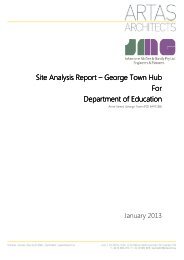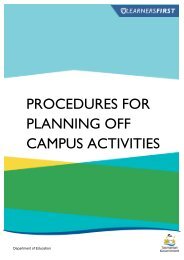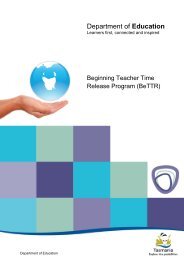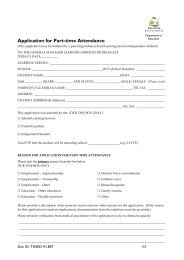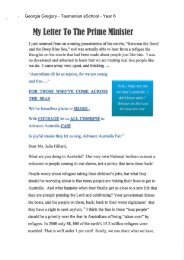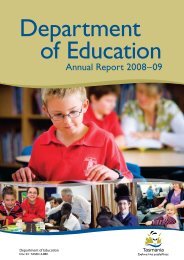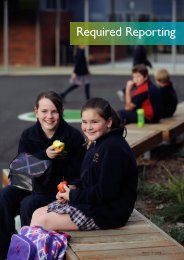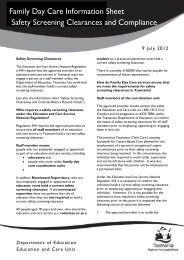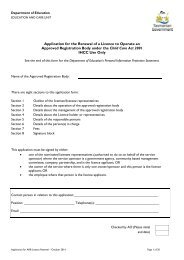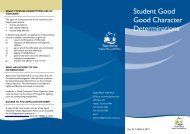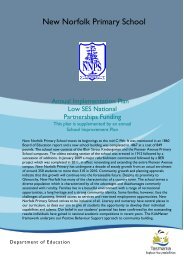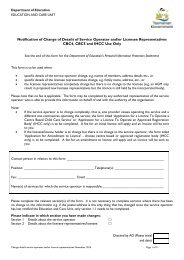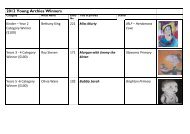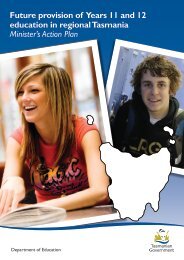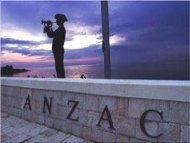Education
DoE Annual Report 2012-2013 - Department of Education
DoE Annual Report 2012-2013 - Department of Education
- No tags were found...
Create successful ePaper yourself
Turn your PDF publications into a flip-book with our unique Google optimized e-Paper software.
Early Years<br />
Direction<br />
Reflecting the Bright Beginnings early years priorities in<br />
the department's Learners First Strategy, the department<br />
is committed to schools developing strong relationships<br />
with parents and community services, including strategies<br />
and programs that promote and support the importance<br />
of the early years for children’s successful learning and<br />
development. This commitment extends to supporting<br />
education and care services to implement appropriate<br />
strategies that reflect the same priorities. These priorities<br />
are strengthened with the ongoing implementation of<br />
the Council of Australian Governments’ (COAG) National Early<br />
Childhood Development Strategy and the National Partnership<br />
Agreements on Early Childhood <strong>Education</strong>.<br />
There are ten child and family centres (CFCs), which are<br />
funded and administered by the department, operating<br />
around the state. Construction of nine of the centres is now<br />
fully complete. In addition there are two Indigenous CFCs<br />
funded through the COAG National Partnership Agreement<br />
on Indigenous Early Childhood Development. Child and<br />
family centres provide a holistic and cohesive approach to<br />
supporting families and their young children.<br />
The state government’s Launching into Learning initiative<br />
began in 2006 as a four year, $12.6 million commitment to<br />
families and young children aged from birth to four years.<br />
In 2008, the government committed a further $4.25 million<br />
in annual funding until 2013, and in 2012 an additional<br />
$1.6 million was committed making this an annual<br />
commitment of $5.85 million.<br />
<strong>Education</strong> and care<br />
The <strong>Education</strong> and Care Unit (ECU) is integral to<br />
maintaining the provision of quality education and care in<br />
Tasmania by:<br />
• implementing nationally consistent regulation under<br />
the National Partnership Agreement on the National<br />
Quality Agenda for Early Childhood <strong>Education</strong> and Care,<br />
including the <strong>Education</strong> and Care Services National Law<br />
(Tasmania) 2011<br />
• providing related support and advice regarding<br />
the quality of early childhood education and care<br />
and outside school hours care services to parents,<br />
educators, carers and the general public<br />
• communicating the importance of implementing the<br />
approved learning frameworks, The Early Years Learning<br />
Framework and the Framework for School Aged Care to<br />
driving quality outcomes for children<br />
• funding eligible services through specific programs<br />
• participating, as applicable, in strategies to build a<br />
skilled workforce<br />
• providing a system of licensing under the<br />
Child Care Act 2001.<br />
The most significant issues continuing to affect the<br />
education and care sector are the challenges associated<br />
with the recruitment and retention of educators,<br />
particularly qualified staff. The ECU is working with the<br />
sector and the Minister’s <strong>Education</strong> and Care Advisory<br />
Council to address this issue and has developed and<br />
facilitated a number of strategies to increase the number<br />
of qualified staff.<br />
From 1 January 2012, the implementation of the COAG<br />
National Quality Agenda has required a significant change<br />
in roles and responsibilities for the ECU. The most<br />
significant of these relate to the commencement of quality<br />
assessment and rating of services from mid-2012 and the<br />
need to operate within a nationally consistent framework,<br />
which is overseen by the Australian Children’s <strong>Education</strong><br />
and Care Quality Authority (ACECQA).<br />
Major Initiatives<br />
Launching into<br />
Learning (LiL)<br />
The LiL initiative aims to:<br />
• give Tasmania’s youngest children the best possible<br />
start in life<br />
• support parents as their child’s first and most<br />
influential teacher<br />
• reach families that find it hardest to access services<br />
and those with the highest need.<br />
LiL provides resources to all primary and combined<br />
schools to develop and lead programs in their local<br />
community to support young children and their families.<br />
LiL aims to give Tasmania’s youngest children the best<br />
possible start in life through support and intervention in<br />
the years prior to Kindergarten, with a particular emphasis<br />
on improving educational outcomes for children from<br />
socially and economically disadvantaged backgrounds.<br />
There is a focus on young children’s learning across all<br />
aspects of their development including early literacy<br />
and numeracy, social and emotional development and<br />
creativity. All schools use Belonging, Being and Becoming<br />
– the Early Years Learning Framework for Australia (EYLF)<br />
to underpin planning. A statewide Early Years team<br />
supports the development of consistent approaches<br />
to implementing the EYLF and working in partnership<br />
with families. In 2012, based on the principle of ‘ongoing<br />
learning and reflective practice’ from the EYLF, the<br />
Early Years team ran a professional learning program<br />
that included support group programs and action<br />
research projects, together with support for individuals<br />
and schools. A total of 94% of schools engaged in two<br />
core professional learning days.<br />
24 Pre-Compulsory and Compulsory <strong>Education</strong> » Early Years



